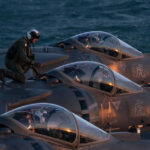
U.S. Secretary of War Pete Hegseth delivered a stark warning on October 23 to drug cartels operating in the Caribbean, likening U.S. tactics against them to the post-9/11 campaign against Al-Qaida and affirming that recent maritime strikes demonstrate the Pentagon’s capacity for precision targeting.
Speaking at a White House briefing on counter-narcotics operations, Hegseth noted the buildup of U.S. forces in the region, including B-52 Stratofortress bombers conducting patrols off Venezuela’s coast and approximately 10% of the Navy’s fleet—encompassing eight surface warships, a nuclear-powered submarine, and amphibious assault ships—positioned to interdict smuggling routes.
The deployment, coordinated by U.S. Southern Command, also features around 10,000 troops stationed in Puerto Rico, several hundred on St. Croix in the USVI, and aboard vessels like the USS Iwo Jima, alongside F-35 fighters and special operations helicopters spotted near Venezuelan waters.
“Our message to these foreign terrorist organizations is we will treat you like we have treated Al Qaida. We will find you, we will map your networks, we will hunt you down and we will kill you,” Hegseth stated. “And you’ve seen that evidence in the maritime domain. Whether it’s in the Caribbean or in the Pacific with the last two strikes, we know exactly who these people are, we know what networks they work with, what foreign terrorist organization they’re a part of, we know where they are going, where they originated from, what they’re carrying. And they know we know.” The Dept. of War has confirmed that intelligence-driven operations have eliminated at least 32 individuals in seven Caribbean strikes since early September.
The Caribbean deployments, which escalated in late August under President Donald Trump’s directive, represent a multifaceted response to what the administration terms “narco-terrorism,” with assets like guided-missile destroyers USS Gravely and USS Jason Dunham providing radar surveillance over key transit corridors north of Venezuela. Hegseth highlighted the role of these forces in enabling the lethal strikes, which have targeted semi-submersible vessels and speedboats suspected of carrying substantial narcotics loads, often linked to groups like the Venezuelan Cartel de los Soles and Colombia’s National Liberation Army (ELN).
A Pentagon fact sheet released the same day detailed how B-52s from Barksdale Air Force Base conducted extended patrols on October 15, demonstrating long-range strike potential without entering sovereign airspace, while special operations helicopters from the 160th Aviation Regiment practiced insertions 90 miles offshore. These maneuvers, Hegseth noted, have disrupted known trafficking routes, with intelligence confirming the vessels’ origins, payloads, and affiliations prior to engagement, all conducted in international waters to comply with operational protocols.
Hegseth’s remarks came hours after the announcement of the eighth overall strike—a first in the eastern Pacific off Colombia’s coast—where U.S. forces destroyed a vessel carrying two individuals identified as “narco-terrorists,” killing both without U.S. casualties, according to a Department of War statement. This followed a ninth strike the previous day in the same region, resulting in three deaths, as detailed by Hegseth in a post accompanied by video footage of the missile impact.
The Pacific expansion, while secondary to Caribbean efforts, reflects the administration’s strategy to address the primary cocaine smuggling corridor, which accounts for 80% of U.S.-bound shipments per Drug Enforcement Administration estimates. “Just as al-Qaida waged war on our homeland, these cartels are waging war on our border and our people,” Hegseth added in the briefing, framing the operations as a “non-international armed conflict” with designated terrorist entities, a legal basis notified to Congress on October 1 under the Authorization for Use of Military Force.
The comments have drawn sharp rebukes from regional leaders, with Colombian President Gustavo Petro labeling the Pacific strikes “murder” that “breaks the norms of international law,” in an October 23 statement, and calling for an end to what he termed a “war scenario” in the hemisphere. Venezuelan President Nicolás Maduro echoed these concerns, denouncing the deployments as “imperialist aggression” in a state television address and ordering heightened militia patrols along the coast. U.N. human rights experts, in a statement issued October 22, expressed alarm over potential “extrajudicial executions,” urging an independent probe into the 37 total deaths across the nine strikes, and highlighting violations of international obligations against intervening in domestic affairs. Hegseth, responding during the briefing, maintained that all actions adhere to self-defense principles under the U.N. Charter, with evidence of narcotics payloads verified post-strike through wreckage analysis.
Hegseth’s pledge aligns with the Trump administration’s broader counter-narcotics doctrine, including a $50 million bounty on Maduro and CIA covert authorizations disclosed October 15, aimed at regime-linked networks. Naval assets like the stealthy MV Ocean Trader continue patrols in the eastern Caribbean, signaling sustained pressure, with Hegseth concluding his remarks by vowing, “These strikes will continue, day after day. These [drug terrorist organizations] are the ‘al-Qaida’ of our hemisphere and will not escape justice.”
British Caribbean News


